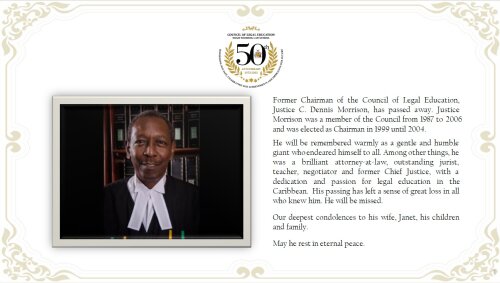Best Business Visa Lawyers in Trinidad and Tobago
Share your needs with us, get contacted by law firms.
Free. Takes 2 min.
Or refine your search by selecting a city:
List of the best lawyers in Trinidad and Tobago
About Business Visa Law in Trinidad and Tobago
The Business Visa in Trinidad and Tobago is a non-immigrant visa designed for foreign nationals who intend to engage in business-related activities in the country. This type of visa is essential for individuals involved in negotiations, meetings, contract signings, or various other commercial endeavors. The visa generally allows for a short-term stay and does not permit employment. The Ministry of National Security oversees the issuance of these visas, ensuring they comply with national interests and security considerations.
Why You May Need a Lawyer
While applying for a Business Visa, individuals often encounter several complex processes and specific legal requirements. Engaging a lawyer can be helpful in situations such as:
- Navigating complex visa application procedures and ensuring all documentation is in order.
- Resolving issues related to denied applications or objections from the immigration department.
- Understanding and complying with local business norms and regulations to avoid legal pitfalls.
- Assisting businesses in handling multiple visa applications for employees or partners.
- Providing advice on legal rights and obligations under Trinidad and Tobago's immigration laws.
Local Laws Overview
The Immigration Act governs the issuance of visas in Trinidad and Tobago, highlighting specific conditions for granting Business Visas. Key aspects include:
- Eligibility Criteria: Applicants must clearly demonstrate the purpose and necessity of their visit for business activities.
- Duration: Business Visas are usually granted for a short period, often up to 30-90 days, depending on the nature of the business activity.
- Employment Prohibition: Visa holders are not permitted to engage in employment that generates income within the country.
- Renewals and Extensions: Extensions may be considered under specific circumstances, and the applicant must apply before their initial visa expires.
- Compliances: All business activities undertaken must align with local laws and not infringe on the sovereignty or security of Trinidad and Tobago.
Frequently Asked Questions
What documents are required for a Business Visa application?
Required documents typically include a valid passport, a completed application form, proof of business activity, invitation letters, financial statements, and sometimes a police clearance certificate.
How long does the Business Visa application process take?
Processing times can vary, but generally, it can take from a few weeks to a couple of months. Applicants should apply well in advance of their intended travel date.
Can I convert my Business Visa to a Work Visa?
Generally, a Business Visa cannot be converted to a Work Visa while in Trinidad and Tobago. Individuals must leave the country and apply for a new visa suitable for their intended activities.
What is the fee for applying for a Business Visa?
Visa fees are subject to change and can vary based on the applicant's nationality and the type of visa. It's advisable to check the latest fee schedule with the Ministry of National Security.
Is a Business Visa mandatory for all business-related travel?
Yes, individuals entering Trinidad and Tobago for business purposes typically need a Business Visa unless they are from a country that has a visa waiver agreement with Trinidad and Tobago.
Can family members accompany a Business Visa holder?
Family members can accompany a Business Visa holder, but they will need to apply for appropriate non-immigrant visas, such as a visitor visa.
Are there any restrictions on the type of business activities allowed?
Yes, activities should be limited to those that do not involve active employment or local business operations such as establishing a business or earning income locally.
What are the common reasons for Business Visa denial?
Common reasons include incomplete applications, lack of sufficient financial proof, past immigration violations, or perceived security risks.
How do restrictions regarding COVID-19 impact Business Visas?
Due to the COVID-19 pandemic, additional health screening and restrictions may be in place, affecting visa processing and travel plans.
Can legal advice expedite the Business Visa process?
While legal advice cannot directly expedite the process, it ensures that applications are complete and compliant, reducing the risk of delays due to errors or omissions.
Additional Resources
Here are some resources and organizations that can provide further assistance:
- Ministry of National Security, Trinidad and Tobago: Primary visa regulatory body.
- Trinidad and Tobago Embassy or Consulate: Guidance for visa applications from abroad.
- Immigration Division of Trinidad and Tobago: In-country assistance and information.
- Trinidad and Tobago Manufacturers’ Association: For individuals involved in the manufacturing business.
- Chamber of Industry and Commerce: Resources for business travelers and investors.
Next Steps
If you require legal assistance for your Business Visa, consider the following steps:
- Consult with an immigration attorney familiar with Trinidad and Tobago's business visa processes.
- Gather all necessary documentation and evaluate your eligibility based on stated criteria.
- Contact the relevant Trinidad and Tobago consulate or embassy for official guidance.
- If needed, seek advice from professional bodies or business associations connected to your intended activity.
Taking proactive steps and seeking appropriate legal counsel can significantly improve your chances of a successful Business Visa application.
Lawzana helps you find the best lawyers and law firms in Trinidad and Tobago through a curated and pre-screened list of qualified legal professionals. Our platform offers rankings and detailed profiles of attorneys and law firms, allowing you to compare based on practice areas, including Business Visa, experience, and client feedback.
Each profile includes a description of the firm's areas of practice, client reviews, team members and partners, year of establishment, spoken languages, office locations, contact information, social media presence, and any published articles or resources. Most firms on our platform speak English and are experienced in both local and international legal matters.
Get a quote from top-rated law firms in Trinidad and Tobago — quickly, securely, and without unnecessary hassle.
Disclaimer:
The information provided on this page is for general informational purposes only and does not constitute legal advice. While we strive to ensure the accuracy and relevance of the content, legal information may change over time, and interpretations of the law can vary. You should always consult with a qualified legal professional for advice specific to your situation.
We disclaim all liability for actions taken or not taken based on the content of this page. If you believe any information is incorrect or outdated, please contact us, and we will review and update it where appropriate.
Browse business visa law firms by city in Trinidad and Tobago
Refine your search by selecting a city.














